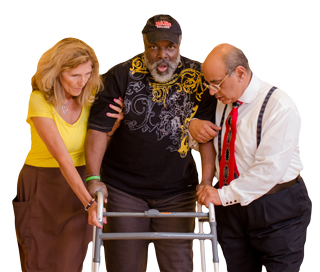

 n the early hours of June 9th, 2011 Dennis suffered multiple strokes and lived to tell the tale. After two near-death episodes, he managed to say; “Now, this is a story…”
n the early hours of June 9th, 2011 Dennis suffered multiple strokes and lived to tell the tale. After two near-death episodes, he managed to say; “Now, this is a story…”
Had he not been awoken at 2.30 am that night by an electrical storm, Dennis would almost certainly have died in his sleep.
Multiple tests showed that Dennis' bi-lateral strokes had been triggered by massive inflammation in the brain (a condition known as Vasculitis), exacerbated by hypertension. The swelling had blocked the oxygen supply to blood vessels in numerous areas of his brain. He was left almost totally paralyzed and barely able to speak. Forty-eight hours later he suffered a brain-stem stroke that knocked out his balance center and he was rushed to the Neurological ICU.
Desperate for answers, Caroline turned to brain scientist Jill Bolte Taylor’s “My Stroke of Insight,” an amazing memoir about her recovery from a severe left-brain hemorrhage. Packed with practical advice about what a stroke patient needs in order to want to recover, she made a few suggestions that were particularly perfect for Dennis: “Introduce me to my old life. Don’t assume that because I cannot play like I used to play that I won’t continue to enjoy music or an instrument, etc.” “Show me old video footage of me doing things to remind me how I spoke, walked and gestured.”
Understanding Dennis’ ambivalence about living, (coming from the Harlem housing projects, he was programmed to die young and was not afraid of death), Caroline made a bedside pledge. "If you chose to live I will do everything to create the kind of life that would make you want to put in the gargantuan effort needed to connect your free floating spirit with your badly broken body."
Science has shown that brain injured people stand a much better chance of healing in a loving environment. It releases their overloaded brains from the worry of navigating an unsafe emotional minefield so they can concentrate on recovery. Caroline instigated the policy of “Love is all around me and everywhere I go”. “The Friends of Dennis” phenomenon was born and he was provided with love and support on a daily basis. Meanwhile Dennis made the decision to fight to recover…
From the time he came out of the ICU, Nina Rosenblum started to film his progress. She hoped that this would be therapeutic. Watching his weekly progress might help him understand what had happened, show him how he was progressing and remind him of who he was.
Eight months into his recovery an extraordinary thing occurred. As Dennis watched rough footage of himself in a physical therapy session, he began making highly insightful editing suggestions. It was an amazing breakthrough for someone who was having such difficulties with his short-term memory that he couldn’t even remember what he’d had for breakfast and couldn’t really comprehend what had happened to him. All at once he became a contributor to Nina's film records as well as its subject. Dennis was back at work doing what he has always done best, telling a story in a new documentary film.
Being creative had given Dennis the purpose he needed by, paradoxically, finding a solution in the problem. The powerful place creativity has in the healing process had become dramatically evident with art and life mirroring one another.
The Friends of Dennis team realized they were witnessing something deeply profound. It took another three weeks for Dennis to observe, “I don’t think I’ve been very well, you know.” And another couple of months for him to say, “I have an idea for the ending this film – I need to walk out the doors of this rehab joint and go home…”“
By Caroline Phipps





Page 1
Page 2
Page 3
Page 4
Page 5
© 2012 - 2017 Friends of Dennis™, All Rights Reserved
Friends of Dennis and Donate Project Program SNT
All names, content, audio and visual in this website are used under rights and permissions.
Website by: Ringo Films Marketing & Advertising